83 items found
-
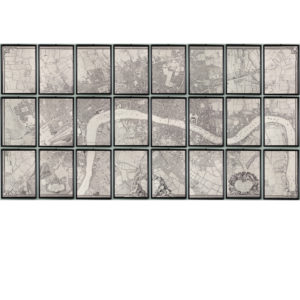
A plan of the cities of London and Westminster, and borough of Southwark,
£4,800 the set of 24 sheetsA plan of the cities of London and Westminster, and borough of Southwark,
The idea to do a new survey had come from the engraver George Vertue, but he and John Rocque could not come to an agreement. Rocque, began the painstaking project in 1737 in partnership with another engraver, John Pine, to survey the central area of London and Westminster, which eventually took 9 years. The completed map measured 6 ½ feet by 13 and comprised of 24 separate sheets. It encompassed an area of 10,000 acres and drawn at a scale of 200ft to the 1inch.£4,800 the set of 24 sheets -
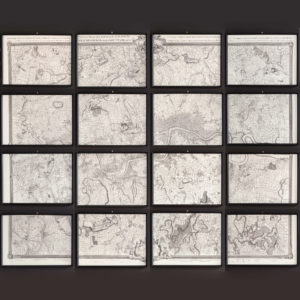
The environs of London in 1746. Impressive sixteen sheet set.
£4,500 the set of sixteen sheetsThe environs of London in 1746. Impressive sixteen sheet set.
John Rocque was of French Huguenot stock from Monosque in Provence. The London he eventually settled in, was an expanding city which had grown unchecked and by the 1730s a new map was needed. Harry Margary, a Senior Civil Scientific Engineer for the Admiralty and self-professed inventor, produced this full-size facsimile of the famous John Rocque map in 1971. The original 18th century map never joined properly due to paper shrinkage in the printing process and only the constituent copper plates joined. For this lithographically printed version Margary altered some of the edges so the maps would join and significantly cleaned up the image area.£4,500 the set of sixteen sheets -
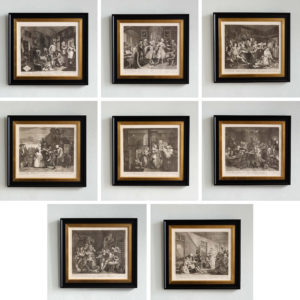
A Rake’s Progress after William Hogarth. A set of eight copper-engraved prints
£2,800 the set of eightA Rake’s Progress after William Hogarth. A set of eight copper-engraved prints
A Rake’s Progress is a series of eight satirical engravings depicting what Hogarth called ‘modern moral subjects’.The series tells the story of Tom Rakewell, a man who inherits a fortune from his city merchant father only to fritter it away on an extravagant lifestyle which ultimately leads to his downfall.£2,800 the set of eight -
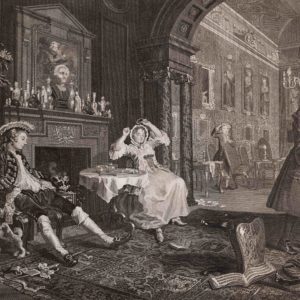
Marriage-a-la Mode, after William Hogarth. A set of six copper-engraved prints
£2,200 the set of sixMarriage-a-la Mode, after William Hogarth. A set of six copper-engraved prints
Marriage-a-la Mode is the story is of a marriage arranged by two self-seeking fathers – a spendthrift nobleman who needs cash and a wealthy City of London merchant who wants to buy into the aristocracy. It was Hogarth’s first moralising series of what he called ‘modern moral subjects’.£2,200 the set of six -
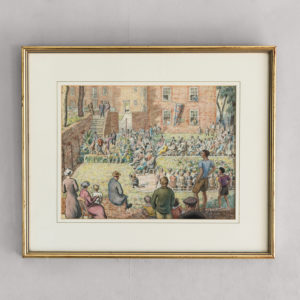
Opening of Well House, by George Charlton
£1,600Opening of Well House, by George Charlton
In 1929 Charlton married Daphne a student at the Slade, he was 30 and she 19. They later purchased 40 New End Square, Hampstead, in 1932 which quickly became a hub of artistic activity. This painting shows the official opening of the flats. Framed£1,600 -
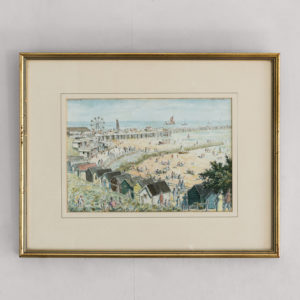
Walton-on-the-Naze by George Charlton
£1,500 -
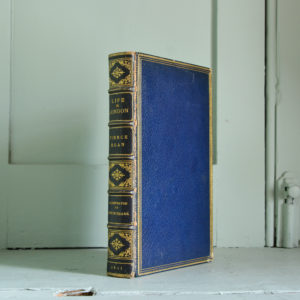
Life in London by Pierce Egan
£1,500Life in London by Pierce Egan
The names are Tom and Jerry are these days synonymous with the cat and mouse cartoons of 1940s, but to a nineteenth century ear, whether Regency or Victorian, they belonged to the rakish Corinthian Tom and his cousin from the country Jerry Hawthorne who, along with their friend Bob Logic, roamed the streets of the capital in search of a good time in Egan’s boisterous comic serial Life in London. Described as ‘a faithful Portraiture of High & Low Life’ from the West End to the East End, Pierce Egan’s comical monthly was one of the popular sensations of its day. The central characters, Tom, Jerry and Logic were well-heeled young men about town, keen to see ‘a bit of life’ in the poorer districts of London. Their escapades and misadventures were largely autobiographical, being drawn from the lives of Egan himself and his illustrators, George and Robert Cruikshank and Isaac Richard. One of the key achievements of Egan’s Life in London was using contemporary slang as the basis of its style. As a result of the success of Life in London, the names Tom and Jerry became proverbial for young men causing disorder.£1,500 -
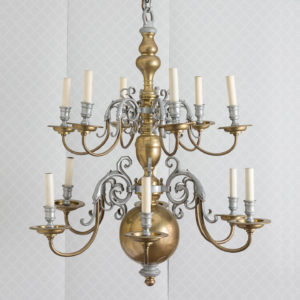
Dutch style chandelier
£1,500Dutch style chandelier
the brass baluster column issuing two tiers of twelve aluminium foliate branches,
restored, rewired and PAT tested (with dents to ball)
£1,500 -
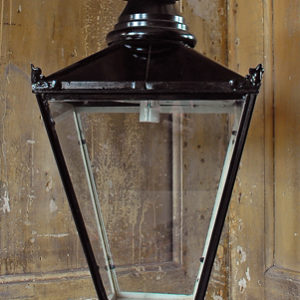
A number of 20th century copper winsor lanterns
£1,450 -
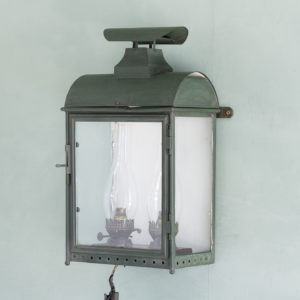
Stable lantern with two simulated oil lamp fittings
£1,400 -

The Dance, by Henri Matisse, Jan – March 1939 / No. 4.
£1,200The Dance, by Henri Matisse, Jan – March 1939 / No. 4.
The Verve Review was a purposefully luxurious. It ran from 1937 to 1960, but with only 38 editions available, due to the high degree of design and editorial work dedicated to each issue. Each edition contained unique lithographic prints, commissioned by the editor, and each cover a double-page lithograph elaborated by one of the artists contained within. It was the brainchild of its editor Stratis Eleftheriades, a Greek National who moved to Paris in the early thirties to take part in the growing Modernist movement, writing under the name of Teriade.£1,200 -
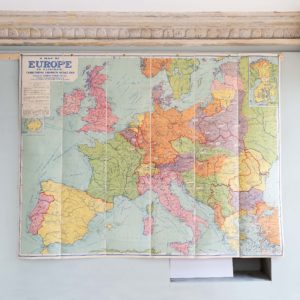
Philips’ A Map of Europe To Illustrate The Territorial Changes Since 1914
£1,200Philips’ A Map of Europe To Illustrate The Territorial Changes Since 1914
The Royal Geographical Society was founded in 1830 as an institution to promote the 'advancement of geographical science'.£1,200 -
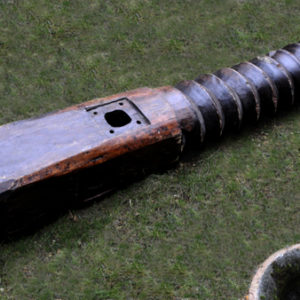
An early twentieth century carved wood wine press
£1,200 -
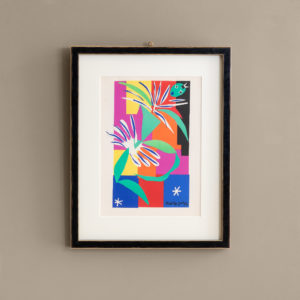
Henri Matisse, ‘The Last Works of Henri Matisse’
£900 eachHenri Matisse, ‘The Last Works of Henri Matisse’
From Verve Vol. IX No. 35/36 published by Tériade under the title 'The Last Works of Henri Matisse'£900 each -
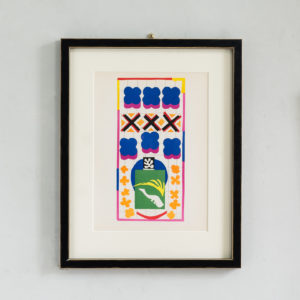
Henri Matisse, ‘The Last Works of Henri Matisse’
£900 eachHenri Matisse, ‘The Last Works of Henri Matisse’
From Verve Vol. IX No. 35/36 published by Tériade under the title 'The Last Works of Henri Matisse'£900 each -
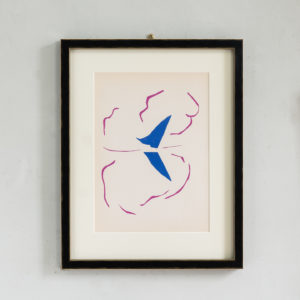
Henri Matisse, ‘The Last Works of Henri Matisse’
£900 eachHenri Matisse, ‘The Last Works of Henri Matisse’
From Verve Vol. IX No. 35/36 published by Tériade under the title 'The Last Works of Henri Matisse'£900 each -
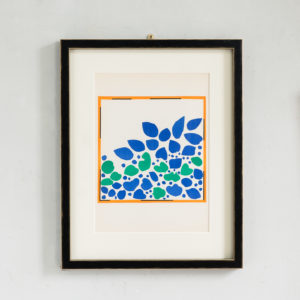
Henri Matisse, ‘The Last Works of Henri Matisse’
£900 eachHenri Matisse, ‘The Last Works of Henri Matisse’
From Verve Vol. IX No. 35/36 published by Tériade under the title 'The Last Works of Henri Matisse'£900 each -
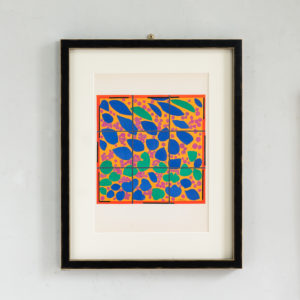
Henri Matisse, ‘The Last Works of Henri Matisse’
£900 eachHenri Matisse, ‘The Last Works of Henri Matisse’
From Verve Vol. IX No. 35/36 published by Tériade under the title 'The Last Works of Henri Matisse'£900 each -
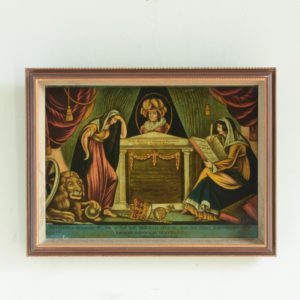
Rare example of a reversed engraving on glass, depicting Caroline of Brunswick, made c1821
£900Rare example of a reversed engraving on glass, depicting Caroline of Brunswick, made c1821
Reverse glass printing is a process whereby a print is transferred to a sheet of glass, varnished and coloured to resemble an oil painting.
The Prince of Wales, son of King George III was introduced to his potential bride, Caroline of Brunswick out of need for money as he was in great debt. Caroline famously, short, fat, ugly and never changed her undergarments, and rarely washed. Her body odour was overwhelming.
Caroline was very popular with the London public whilst King George was not. Every day when attending the House of Lords her coach was escorted by the cheering mob. George IV’s Coronation was to be the 29th April 1821 but Caroline was told that she would not be taking part in it. Undaunted Caroline arrived at the door of Westminster Abbey on the day demanding to be admitted, but the doors were slammed in her face.
She died 19 days after her frustrated attempt to get into the Abbey and was buried in Brunswick, and on her coffin was inscribed… ‘CAROLINE THE INJURED QUEEN OF ENGLAND’.
£900 -
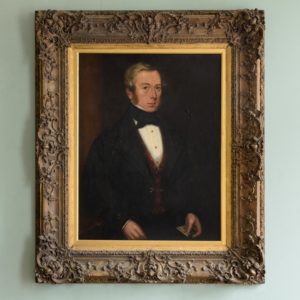
Portrait of a Gentleman
£900 -
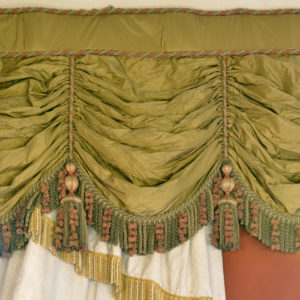
Highly decorative swag pelmets
£890 - £2'000.00 depending on sizeHighly decorative swag pelmets
in moss green silk with dusty rose rope and tassel trimmings. Decorative hold ups of matching rose detailed tassels. Three sections available.£890 - £2'000.00 depending on size -
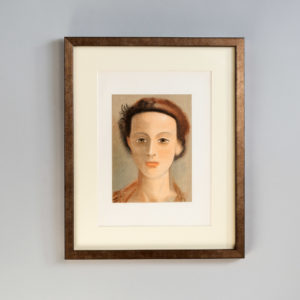
Portrait by Andre Derain, Verve Vol 2 / No. 5-6.
£800Portrait by Andre Derain, Verve Vol 2 / No. 5-6.
The Verve Review was a purposefully luxurious. It ran from 1937 to 1960, but with only 38 editions available, due to the high degree of design and editorial work dedicated to each issue. Each edition contained unique lithographic prints, commissioned by the editor, and each cover a double-page lithograph elaborated by one of the artists contained within. It was the brainchild of its editor Stratis Eleftheriades, a Greek National who moved to Paris in the early thirties to take part in the growing Modernist movement, writing under the name of Teriade.£800 -
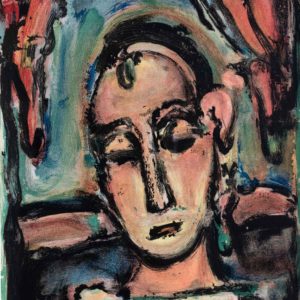
Head of a Girl by George Rouault, Verve Vol 2 / No. 5-6.
£800Head of a Girl by George Rouault, Verve Vol 2 / No. 5-6.
The Verve Review was a purposefully luxurious. It ran from 1937 to 1960, but with only 38 editions available, due to the high degree of design and editorial work dedicated to each issue. Each edition contained unique lithographic prints, commissioned by the editor, and each cover a double-page lithograph elaborated by one of the artists contained within. It was the brainchild of its editor Stratis Eleftheriades, a Greek National who moved to Paris in the early thirties to take part in the growing Modernist movement, writing under the name of Teriade.£800 -
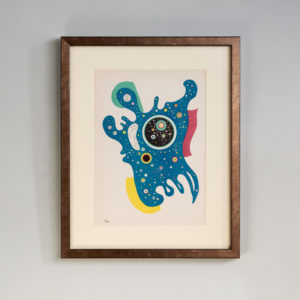
Stars by Wassily Kandinsky, Verve Vol. 1 / No. 2.
£800Stars by Wassily Kandinsky, Verve Vol. 1 / No. 2.
The Verve Review was a purposefully luxurious. It ran from 1937 to 1960, but with only 38 editions available, due to the high degree of design and editorial work dedicated to each issue. Each edition contained unique lithographic prints, commissioned by the editor, and each cover a double-page lithograph elaborated by one of the artists contained within. It was the brainchild of its editor Stratis Eleftheriades, a Greek National who moved to Paris in the early thirties to take part in the growing Modernist movement, writing under the name of Teriade.£800 -
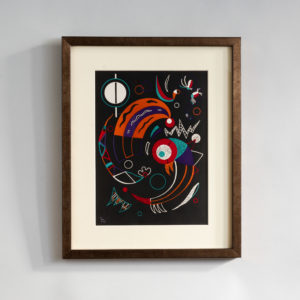
Comets by Wassily Kandinsky, Verve Vol. 1 / No. 2.
£800Comets by Wassily Kandinsky, Verve Vol. 1 / No. 2.
The Verve Review was a purposefully luxurious. It ran from 1937 to 1960, but with only 38 editions available, due to the high degree of design and editorial work dedicated to each issue. Each edition contained unique lithographic prints, commissioned by the editor, and each cover a double-page lithograph elaborated by one of the artists contained within. It was the brainchild of its editor Stratis Eleftheriades, a Greek National who moved to Paris in the early thirties to take part in the growing Modernist movement, writing under the name of Teriade.£800 -
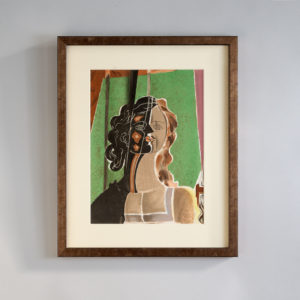
Figure by Georges Braque, Verve Vol 2 / No. 5-6.
£800Figure by Georges Braque, Verve Vol 2 / No. 5-6.
The Verve Review was a purposefully luxurious. It ran from 1937 to 1960, but with only 38 editions available, due to the high degree of design and editorial work dedicated to each issue. Each edition contained unique lithographic prints, commissioned by the editor, and each cover a double-page lithograph elaborated by one of the artists contained within. It was the brainchild of its editor Stratis Eleftheriades, a Greek National who moved to Paris in the early thirties to take part in the growing Modernist movement, writing under the name of Teriade.£800 -
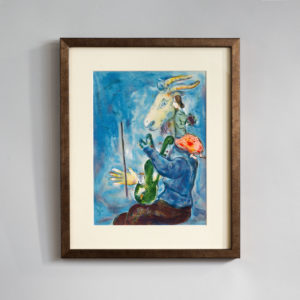
Printemps by Marc Chagall, Verve Vol. 1 / No. 3.
£800Printemps by Marc Chagall, Verve Vol. 1 / No. 3.
The Verve Review was a purposefully luxurious. It ran from 1937 to 1960, but with only 38 editions available, due to the high degree of design and editorial work dedicated to each issue. Each edition contained unique lithographic prints, commissioned by the editor, and each cover a double-page lithograph elaborated by one of the artists contained within. It was the brainchild of its editor Stratis Eleftheriades, a Greek National who moved to Paris in the early thirties to take part in the growing Modernist movement, writing under the name of Teriade.£800 -
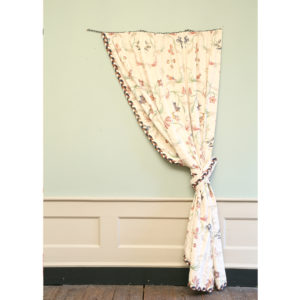
One pair of printed silk twill curtains,
£800 pairOne pair of printed silk twill curtains,
Bird and foliate design with burgundy, cream and navy plait trimming. Headed with a box pleat, lined and interlined. Made by Harrods.£800 pair -
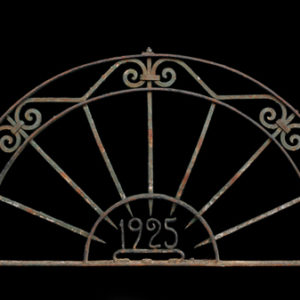
A wrought iron demi-lune over door
£700 -
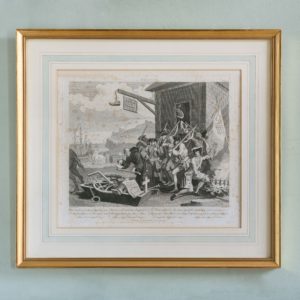
England and France, after William Hogarth published c1805
£650 the setEngland and France, after William Hogarth published c1805
William Hogarth produced these prints to boost public morale when an invasion from France seemed probable.
Hogarth depicts the weak and emaciated army ready to invade England. The alehouse sign reading 'Meagre Soup at the Royal Comb' points this up. There is also an officer roasting four frogs on his sword. A further soldier carries a banner which reads 'Vengeance with the good beer and good beef of England'. There is also a portly monk (obviously the church folk won't be hungry), and he carries plans for a monastery to be built at Blackfriars.
In contrast he believed the English to be always well fed and always merry, despite the evidence of widespread poverty. Here a recruitment officer is shown measuring up a volunteer. The man has to stand on tiptoe to reach the required height. A round of beef and some porter is on the table in front of some revellers, one of whom is drawing a pastiche of the French King, who is uttering the words "You take my fine ships you bede pirate you bede Teef me send my grand armies and hang you all Morbleu."
£650 the set -
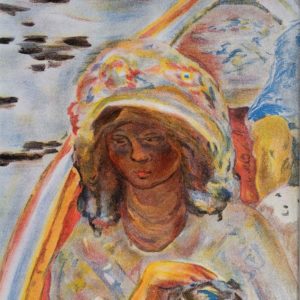
Portrait Fragment by Pierre Bonnard, Verve Vol 2 / No. 5-6.
£600Portrait Fragment by Pierre Bonnard, Verve Vol 2 / No. 5-6.
The Verve Review was a purposefully luxurious. It ran from 1937 to 1960, but with only 38 editions available, due to the high degree of design and editorial work dedicated to each issue. Each edition contained unique lithographic prints, commissioned by the editor, and each cover a double-page lithograph elaborated by one of the artists contained within. It was the brainchild of its editor Stratis Eleftheriades, a Greek National who moved to Paris in the early thirties to take part in the growing Modernist movement, writing under the name of Teriade.£600 -
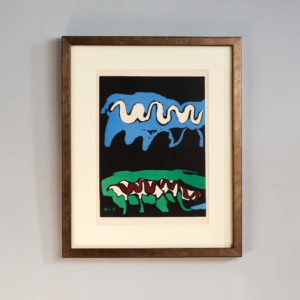
The Four Elements, Earth by Francisco Bores, Verve Vol. 1 / No. 1.
£600The Four Elements, Earth by Francisco Bores, Verve Vol. 1 / No. 1.
The Verve Review was a purposefully luxurious. It ran from 1937 to 1960, but with only 38 editions available, due to the high degree of design and editorial work dedicated to each issue. Each edition contained unique lithographic prints, commissioned by the editor, and each cover a double-page lithograph elaborated by one of the artists contained within. It was the brainchild of its editor Stratis Eleftheriades, a Greek National who moved to Paris in the early thirties to take part in the growing Modernist movement, writing under the name of Teriade.£600 -
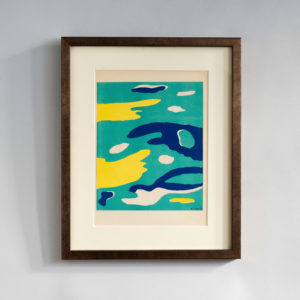
The Four Elements, Water by Fernand Leger, Verve Vol. 1 / No. 1.
£600The Four Elements, Water by Fernand Leger, Verve Vol. 1 / No. 1.
The Verve Review was a purposefully luxurious. It ran from 1937 to 1960, but with only 38 editions available, due to the high degree of design and editorial work dedicated to each issue. Each edition contained unique lithographic prints, commissioned by the editor, and each cover a double-page lithograph elaborated by one of the artists contained within. It was the brainchild of its editor Stratis Eleftheriades, a Greek National who moved to Paris in the early thirties to take part in the growing Modernist movement, writing under the name of Teriade.£600 -
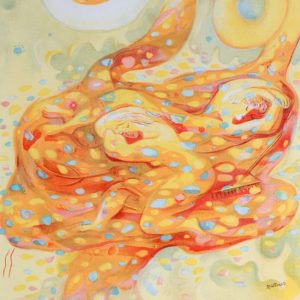
Autumn by Abraham Rattner, Verve Vol. 1 / No. 3.
£600Autumn by Abraham Rattner, Verve Vol. 1 / No. 3.
The Verve Review was a purposefully luxurious. It ran from 1937 to 1960, but with only 38 editions available, due to the high degree of design and editorial work dedicated to each issue. Each edition contained unique lithographic prints, commissioned by the editor, and each cover a double-page lithograph elaborated by one of the artists contained within. It was the brainchild of its editor Stratis Eleftheriades, a Greek National who moved to Paris in the early thirties to take part in the growing Modernist movement, writing under the name of Teriade.£600 -
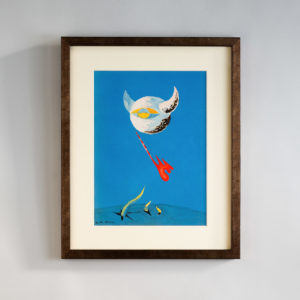
The Moon by André Masson, Verve Vol. 1 / No. 2.
£600The Moon by André Masson, Verve Vol. 1 / No. 2.
The Verve Review was a purposefully luxurious. It ran from 1937 to 1960, but with only 38 editions available, due to the high degree of design and editorial work dedicated to each issue. Each edition contained unique lithographic prints, commissioned by the editor, and each cover a double-page lithograph elaborated by one of the artists contained within. It was the brainchild of its editor Stratis Eleftheriades, a Greek National who moved to Paris in the early thirties to take part in the growing Modernist movement, writing under the name of Teriade.£600 -
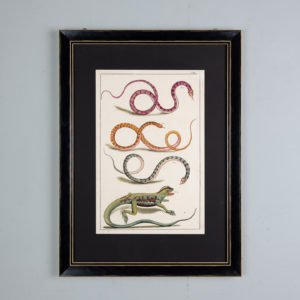
Snakes by Albertus Seba (1665-1736)
£540 eachSnakes by Albertus Seba (1665-1736)
Published to illustrate Seba's 'cabinet of curiosities' Framed£540 each -
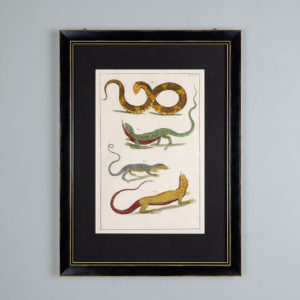
Snakes by Albertus Seba (1665-1736)
£540 eachSnakes by Albertus Seba (1665-1736)
Published to illustrate Seba's 'cabinet of curiosities' Framed£540 each -
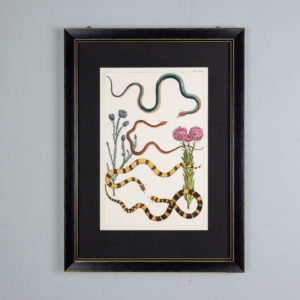
Snakes by Albertus Seba (1665-1736)
£540 eachSnakes by Albertus Seba (1665-1736)
Published to illustrate Seba's 'cabinet of curiosities' Framed£540 each -
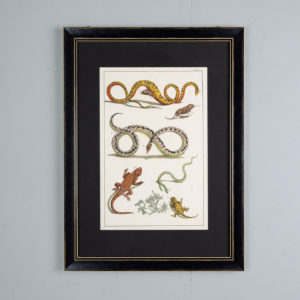
Snakes by Albertus Seba (1665-1736)
£540 eachSnakes by Albertus Seba (1665-1736)
Published to illustrate Seba's 'cabinet of curiosities' Framed£540 each -
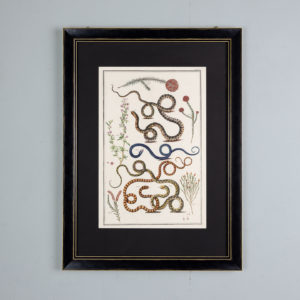
Snakes by Albertus Seba (1665-1736)
£540 eachSnakes by Albertus Seba (1665-1736)
Published to illustrate Seba's 'cabinet of curiosities' Framed£540 each -
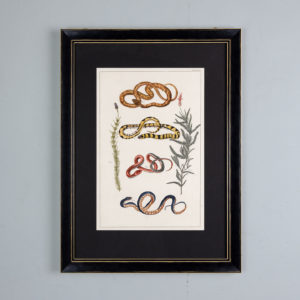
Snakes by Albertus Seba (1665-1736)
£540 eachSnakes by Albertus Seba (1665-1736)
Published to illustrate Seba's 'cabinet of curiosities' Framed£540 each -
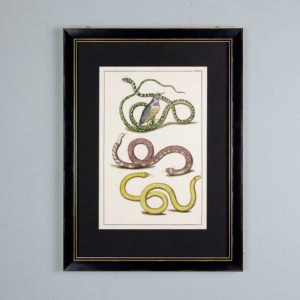
Snakes by Albertus Seba (1665-1736)
£540 eachSnakes by Albertus Seba (1665-1736)
Published to illustrate Seba's 'cabinet of curiosities' Framed£540 each -
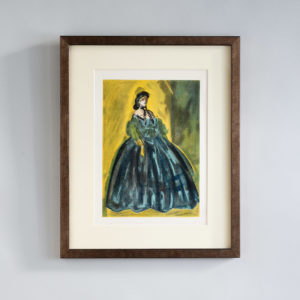
Portraits Part II by Constantin Guys, Verve Vol 2 / No. 5-6.
£500Portraits Part II by Constantin Guys, Verve Vol 2 / No. 5-6.
The Verve Review was a purposefully luxurious. It ran from 1937 to 1960, but with only 38 editions available, due to the high degree of design and editorial work dedicated to each issue. Each edition contained unique lithographic prints, commissioned by the editor, and each cover a double-page lithograph elaborated by one of the artists contained within. It was the brainchild of its editor Stratis Eleftheriades, a Greek National who moved to Paris in the early thirties to take part in the growing Modernist movement, writing under the name of Teriade.£500 -
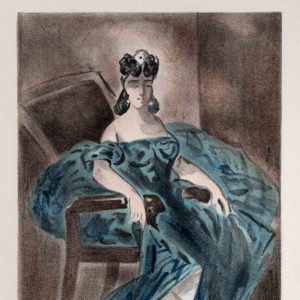
Portraits Part I by Constantin Guys, Verve Vol 2 / No. 5-6.
£500Portraits Part I by Constantin Guys, Verve Vol 2 / No. 5-6.
The Verve Review was a purposefully luxurious. It ran from 1937 to 1960, but with only 38 editions available, due to the high degree of design and editorial work dedicated to each issue. Each edition contained unique lithographic prints, commissioned by the editor, and each cover a double-page lithograph elaborated by one of the artists contained within. It was the brainchild of its editor Stratis Eleftheriades, a Greek National who moved to Paris in the early thirties to take part in the growing Modernist movement, writing under the name of Teriade.£500 -
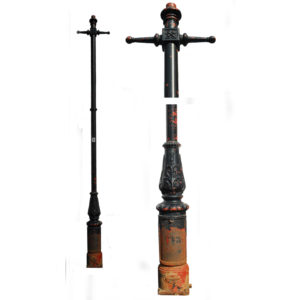
A number of cast iron lamp posts
£500 each -
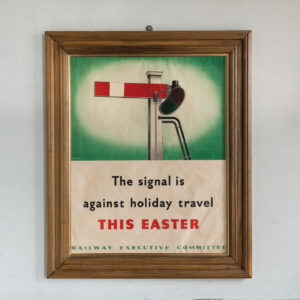
‘The signal is against holiday travel this Easter’
£420‘The signal is against holiday travel this Easter’
Born in Yarmouth, Reginald Mayes’ career began in the design studio of the Eastern Daily Press in Norwich. He moved to London where he designed water marks for paper manufacturers and studied life drawing at the Regent Street Polytechnic and Lithography under Gardiner, Clive. In the early 1930s he became chief staff artist at the London Midland and Scottish Railway public relations department, designing leaflets and posters. In the Second World War, Mayes produced a wide range of anti-travel and propaganda posters for the Railway Executive Committee. They discouraged railway travel with some humorous slogans such as ‘The signal is against holiday travel this Easter’. After the war he did freelance work before retiring to Kent where he relaxed painting landscapes.£420 -
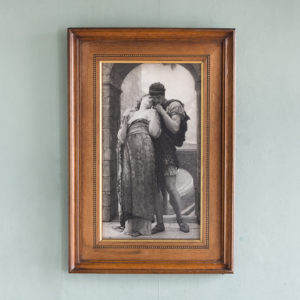
Lord Leighton, Wedded,
£395 -
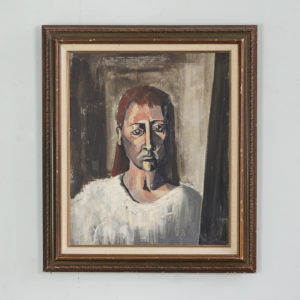
Harry by Sheila Steafel,
£300 -
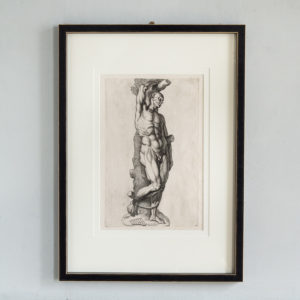
17th century copper-engravings of Classical Sculptures
£295 each17th century copper-engravings of Classical Sculptures
These prints are from a series showing the antique marble statues from the collection of Vincenzo Giustiniana, published by Joachim von Sandrart. These statues were on display in the 'Galleria Giustiniana del Marchese Vincenzo Giustiniani'. Sandrart assembled a team of mostly Dutch and French artists to produce the engravings for the Galleria, including Theodor Matham, Michael Natalis, Renier Persin, Cornelis Bloemaert, Claude Mellan, and Francois Perrier. The work was published in Rome circa 1636. Galleria served as a record of the antiquities and statues of the famous Giustiniani art collection. The Giustiniani brothers were exceedingly wealthy and descendants of the Genoese dynasty and became noted collectors of art. At the time of Vincenzo's death in 1637 he had amassed 600 paintings and 1800 ancient sculptures. Original copper-engraving, mounted and framed in black. Showing Marsyas.£295 each -
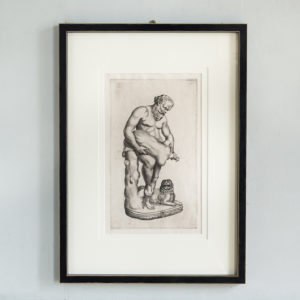
17th century copper-engravings of Classical Sculptures
£295 each17th century copper-engravings of Classical Sculptures
These prints are from a series showing the antique marble statues from the collection of Vincenzo Giustiniana, published by Joachim von Sandrart. These statues were on display in the 'Galleria Giustiniana del Marchese Vincenzo Giustiniani'. Sandrart assembled a team of mostly Dutch and French artists to produce the engravings for the Galleria, including Theodor Matham, Michael Natalis, Renier Persin, Cornelis Bloemaert, Claude Mellan, and Francois Perrier. The work was published in Rome circa 1636. Galleria served as a record of the antiquities and statues of the famous Giustiniani art collection. The Giustiniani brothers were exceedingly wealthy and descendants of the Genoese dynasty and became noted collectors of art. At the time of Vincenzo's death in 1637 he had amassed 600 paintings and 1800 ancient sculptures. Original copper-engraving, mounted and framed in black.£295 each -
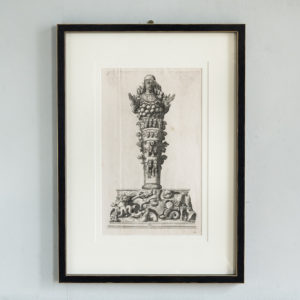
17th century copper-engravings of Classical Sculptures
£295 each17th century copper-engravings of Classical Sculptures
These prints are from a series showing the antique marble statues from the collection of Vincenzo Giustiniana, published by Joachim von Sandrart. These statues were on display in the 'Galleria Giustiniana del Marchese Vincenzo Giustiniani'. Sandrart assembled a team of mostly Dutch and French artists to produce the engravings for the Galleria, including Theodor Matham, Michael Natalis, Renier Persin, Cornelis Bloemaert, Claude Mellan, and Francois Perrier. The work was published in Rome circa 1636. Galleria served as a record of the antiquities and statues of the famous Giustiniani art collection. The Giustiniani brothers were exceedingly wealthy and descendants of the Genoese dynasty and became noted collectors of art. At the time of Vincenzo's death in 1637 he had amassed 600 paintings and 1800 ancient sculptures. Original copper-engraving, mounted and framed in black.£295 each -
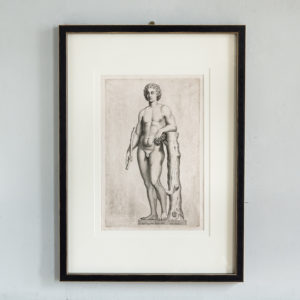
17th century copper-engravings of Classical Sculptures
£295 each17th century copper-engravings of Classical Sculptures
These prints are from a series showing the antique marble statues from the collection of Vincenzo Giustiniana, published by Joachim von Sandrart. These statues were on display in the 'Galleria Giustiniana del Marchese Vincenzo Giustiniani'. Sandrart assembled a team of mostly Dutch and French artists to produce the engravings for the Galleria, including Theodor Matham, Michael Natalis, Renier Persin, Cornelis Bloemaert, Claude Mellan, and Francois Perrier. The work was published in Rome circa 1636. Galleria served as a record of the antiquities and statues of the famous Giustiniani art collection. The Giustiniani brothers were exceedingly wealthy and descendants of the Genoese dynasty and became noted collectors of art. At the time of Vincenzo's death in 1637 he had amassed 600 paintings and 1800 ancient sculptures. Original copper-engraving, mounted and framed in black.£295 each -
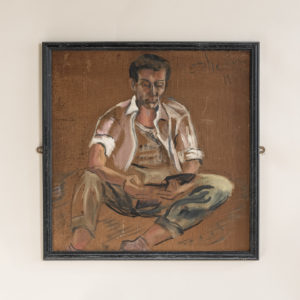
Harry reading by Sheila Steafel
£200Harry reading by Sheila Steafel
Oil sketch on masonite board of Harry H. Corbett, signed and dated 59. Framed£200 -
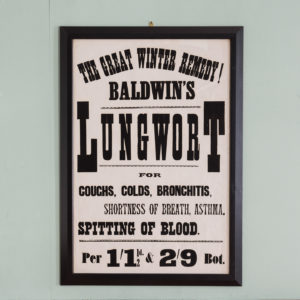
Original chemist shop advertising poster, Baldwin’s Lungwort
£200Original chemist shop advertising poster, Baldwin’s Lungwort
Original woodblock, letterpress poster published c1880 for G. Baldwin & Co, Walworth Road A great historical item for those living south of the river, a very small quantity are available, but once gone, they are gone forever! Condition consistent with a 120 year old loose piece of paper, tears, stains small losses etc.£200 -
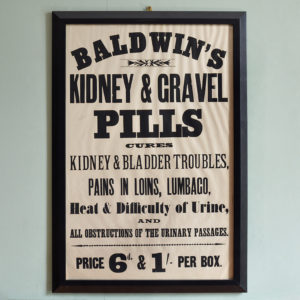
Original chemist shop advertising poster, Baldwin’s Kidney and Gravel Pills
£200Original chemist shop advertising poster, Baldwin’s Kidney and Gravel Pills
Original woodblock, letterpress poster published c1880 for G. Baldwin & Co, Walworth Road A great historical item for those living south of the river, a very small quantity are available, but once gone, they are gone forever! Condition consistent with a 120 year old loose piece of paper, tears, stains small losses etc.£200 -
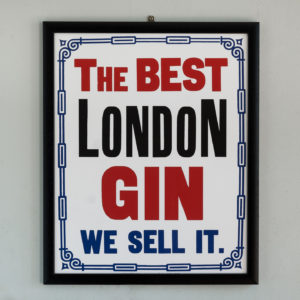
The Best London Gin,
£195The Best London Gin,
During the late 19th and early 20th centuries this type of poster was a ubiquitous feature of every corner shop, café and public house. Printed with wood block type onto poor quality newsprint paper they were a transient form of advertising designed to be used then discarded, so hardly any originals exist. These reproductions are based on some surviving originals printed by London firm of Samuel Reeves Ltd, which have been scanned, restored and reprinted onto fine art paper using archival quality ink. Framed£195 -

Step Inside and Prove It,
£195Step Inside and Prove It,
During the late 19th and early 20th centuries this type of poster was a ubiquitous feature of every corner shop, café and public house. Printed with wood block type onto poor quality newsprint paper they were a transient form of advertising designed to be used then discarded, so hardly any originals exist. These reproductions are based on some surviving originals printed by London firm of Samuel Reeves Ltd, which have been scanned, restored and reprinted onto fine art paper using archival quality ink. Framed£195 -

Come Over Here If You Want A Good Clean Shave
£195Come Over Here If You Want A Good Clean Shave
During the late 19th and early 20th centuries this type of poster was a ubiquitous feature of every corner shop, café and public house. Printed with wood block type onto poor quality newsprint paper they were a transient form of advertising designed to be used then discarded, so hardly any originals exist. These reproductions are based on some surviving originals printed by London firm of Samuel Reeves Ltd, which have been scanned, restored and reprinted onto fine art paper using archival quality ink. Framed£195 -
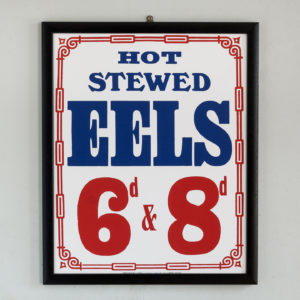
Hot Stewed Eels,
£195Hot Stewed Eels,
During the late 19th and early 20th centuries this type of poster was a ubiquitous feature of every corner shop, café and public house. Printed with wood block type onto poor quality newsprint paper they were a transient form of advertising designed to be used then discarded, so hardly any originals exist. These reproductions are based on some surviving originals printed by London firm of Samuel Reeves Ltd, which have been scanned, restored and reprinted onto fine art paper using archival quality ink. Framed£195 -
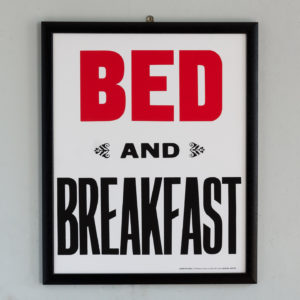
Bed and Breakfast,
£195Bed and Breakfast,
During the late 19th and early 20th centuries this type of poster was a ubiquitous feature of every corner shop, café and public house. Printed with wood block type onto poor quality newsprint paper they were a transient form of advertising designed to be used then discarded, so hardly any originals exist. These reproductions are based on some surviving originals printed by London firm of Samuel Reeves Ltd, which have been scanned, restored and reprinted onto fine art paper using archival quality ink. Framed£195 -

There is Not a Cross Word from our Customers,
£195There is Not a Cross Word from our Customers,
During the late 19th and early 20th centuries this type of poster was a ubiquitous feature of every corner shop, café and public house. Printed with wood block type onto poor quality newsprint paper they were a transient form of advertising designed to be used then discarded, so hardly any originals exist. These reproductions are based on some surviving originals printed by London firm of Samuel Reeves Ltd, which have been scanned, restored and reprinted onto fine art paper using archival quality ink. Framed£195 -
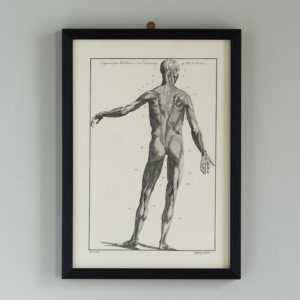
Anatomical prints,
£175 eachAnatomical prints,
reproduction based on the 1765 work by the Rev. Middleton. In black frame. 'Facing Muscle Plate LX'.£175 each -
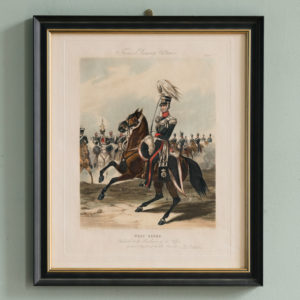
Original aquatint,
£160 -
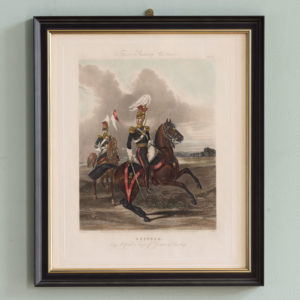
Original aquatint,
£160 -
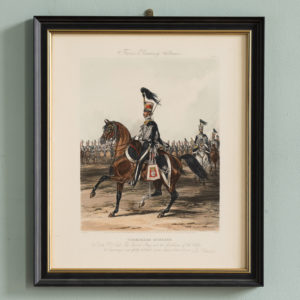
Original aquatint,
£160 -
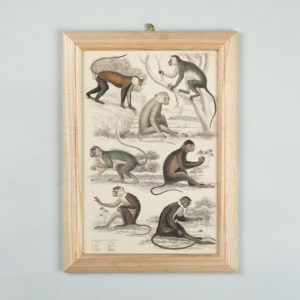
Wild Animals by Captain Brown
£95Wild Animals by Captain Brown
19th century engravings based on the drawings of famed naturalist; Captain Thomas Brown. Framed in natural ash. 'Cercopithecus, Guenons'£95 -
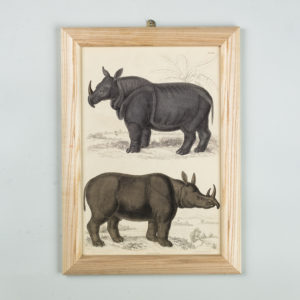
Wild Animals by Captain Brown
£95Wild Animals by Captain Brown
19th century engravings based on the drawings of famed naturalist; Captain Thomas Brown. Framed in natural ash. 'Rhinoceros'.£95 -
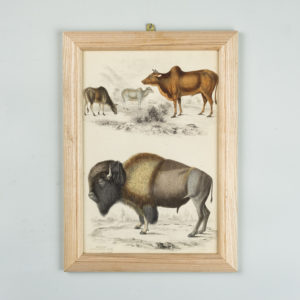
Wild Animals by Captain Brown
£95Wild Animals by Captain Brown
19th century engravings based on the drawings of famed naturalist; Captain Thomas Brown. Framed in natural ash. 'Bos, Bulls'£95 -
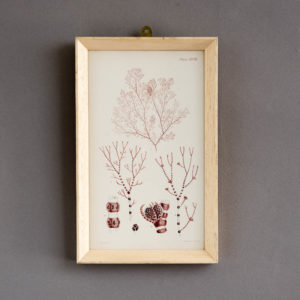
Phycologia Britannica – A History of British sea-weeds,
£85 eachPhycologia Britannica – A History of British sea-weeds,
original colour lithographs by Reeve Brothers for William Henry Harvey. Framed. Plate CXCIII£85 each -
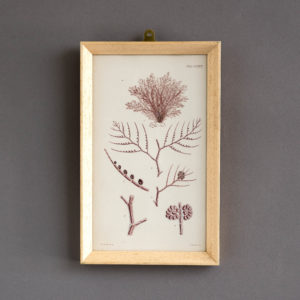
Phycologia Britannica – A History of British sea-weeds,
£85 eachPhycologia Britannica – A History of British sea-weeds,
original colour lithographs by Reeve Brothers for William Henry Harvey. Framed. Plate CCXXX£85 each -
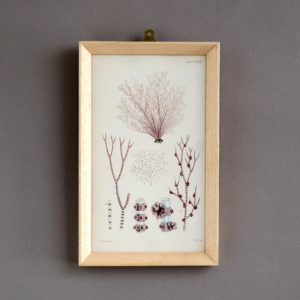
Phycologia Britannica – A History of British sea-weeds,
£85 eachPhycologia Britannica – A History of British sea-weeds,
original colour lithographs by Reeve Brothers for William Henry Harvey. Framed. Plate CCXIX£85 each -
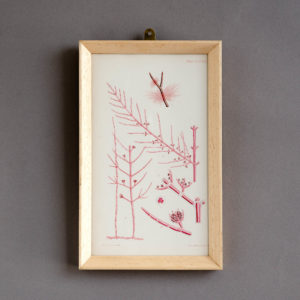
Phycologia Britannica – A History of British sea-weeds,
£85 eachPhycologia Britannica – A History of British sea-weeds,
original colour lithographs by Reeve Brothers for William Henry Harvey. Framed. Plate CLXXIX£85 each -
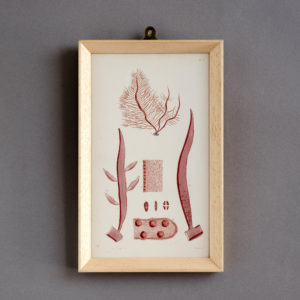
Phycologia Britannica – A History of British sea-weeds,
£85 eachPhycologia Britannica – A History of British sea-weeds,
original colour lithographs by Reeve Brothers for William Henry Harvey. Framed. Plate C£85 each -
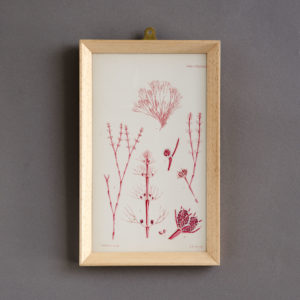
Phycologia Britannica – A History of British sea-weeds,
£85 eachPhycologia Britannica – A History of British sea-weeds,
original colour lithographs by Reeve Brothers for William Henry Harvey. Framed. Plate CCLXXXI.£85 each -
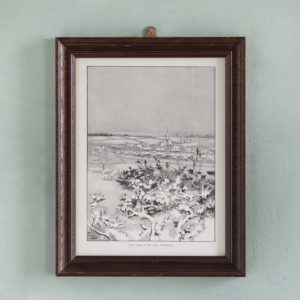
London City Suburbs, original half-tone prints published 1893
£55 eachLondon City Suburbs, original half-tone prints published 1893
Evocative prints based on the work of painter and illustrator William Luker which were engraved in Paris by Ch. Guillaume & Cie. for the Leadenhall Press publication "London City Suburbs" This prints are probably the only illustrations that show the London suburbs just before the 20th century. 'View from Furze Hill, Sydenham'.£55 each -
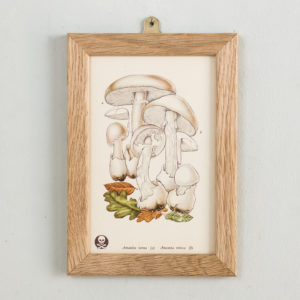
Edible and Poisonous Fungi lithographs,
£48 eachEdible and Poisonous Fungi lithographs,
printed in 1945 by John Swain Ltd. 'Amanita verna, Amanita virosa'.£48 each -
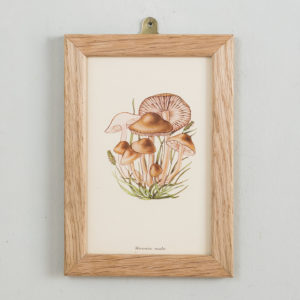
Edible and Poisonous Fungi lithographs,
£48 eachEdible and Poisonous Fungi lithographs,
printed in 1945 by John Swain Ltd. 'Marasmius oreades'.£48 each -
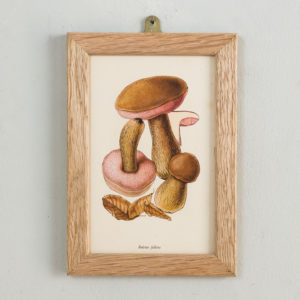
Edible and Poisonous Fungi lithographs,
£48 eachEdible and Poisonous Fungi lithographs,
printed in 1945 by John Swain Ltd. 'Boletus felleus'.£48 each -
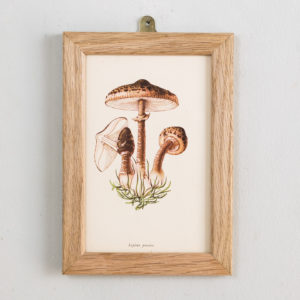
Edible and Poisonous Fungi lithographs,
£48 eachEdible and Poisonous Fungi lithographs,
printed in 1945 by John Swain Ltd. 'Lepiota procera'.£48 each -
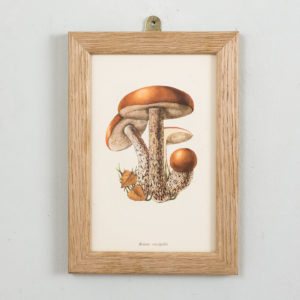
Edible and Poisonous Fungi lithographs,
£48 eachEdible and Poisonous Fungi lithographs,
printed in 1945 by John Swain Ltd. 'Boletus versipellis'.£48 each -
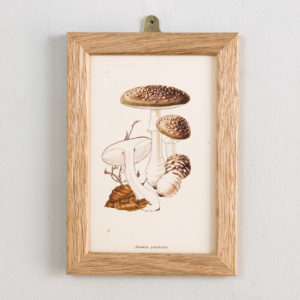
Edible and Poisonous Fungi lithographs,
£48 eachEdible and Poisonous Fungi lithographs,
printed in 1945 by John Swain Ltd. 'Amanita pantherina'.£48 each -
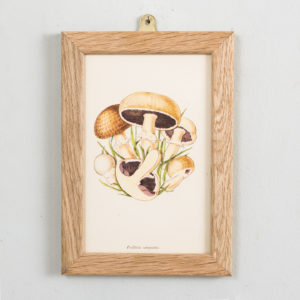
Edible and Poisonous Fungi lithographs,
£48 eachEdible and Poisonous Fungi lithographs,
printed in 1945 by John Swain Ltd. 'Psalliota campestris'.£48 each -
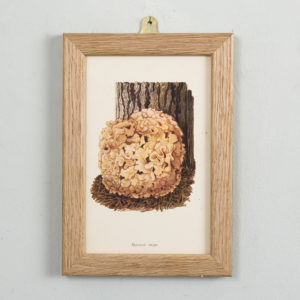
Edible and Poisonous Fungi lithographs,
£48 eachEdible and Poisonous Fungi lithographs,
printed in 1945 by John Swain Ltd. 'Sparassis crispa'.£48 each
Featured Items
-

Printemps by Marc Chagall, Verve Vol. 1 / No. 3.
£800Printemps by Marc Chagall, Verve Vol. 1 / No. 3.
The Verve Review was a purposefully luxurious. It ran from 1937 to 1960, but with only 38 editions available, due to the high degree of design and editorial work dedicated to each issue. Each edition contained unique lithographic prints, commissioned by the editor, and each cover a double-page lithograph elaborated by one of the artists contained within. It was the brainchild of its editor Stratis Eleftheriades, a Greek National who moved to Paris in the early thirties to take part in the growing Modernist movement, writing under the name of Teriade.£800 -

Figure by Georges Braque, Verve Vol 2 / No. 5-6.
£800Figure by Georges Braque, Verve Vol 2 / No. 5-6.
The Verve Review was a purposefully luxurious. It ran from 1937 to 1960, but with only 38 editions available, due to the high degree of design and editorial work dedicated to each issue. Each edition contained unique lithographic prints, commissioned by the editor, and each cover a double-page lithograph elaborated by one of the artists contained within. It was the brainchild of its editor Stratis Eleftheriades, a Greek National who moved to Paris in the early thirties to take part in the growing Modernist movement, writing under the name of Teriade.£800 -

The Moon by André Masson, Verve Vol. 1 / No. 2.
£600The Moon by André Masson, Verve Vol. 1 / No. 2.
The Verve Review was a purposefully luxurious. It ran from 1937 to 1960, but with only 38 editions available, due to the high degree of design and editorial work dedicated to each issue. Each edition contained unique lithographic prints, commissioned by the editor, and each cover a double-page lithograph elaborated by one of the artists contained within. It was the brainchild of its editor Stratis Eleftheriades, a Greek National who moved to Paris in the early thirties to take part in the growing Modernist movement, writing under the name of Teriade.£600 -

Portraits Part I by Constantin Guys, Verve Vol 2 / No. 5-6.
£500Portraits Part I by Constantin Guys, Verve Vol 2 / No. 5-6.
The Verve Review was a purposefully luxurious. It ran from 1937 to 1960, but with only 38 editions available, due to the high degree of design and editorial work dedicated to each issue. Each edition contained unique lithographic prints, commissioned by the editor, and each cover a double-page lithograph elaborated by one of the artists contained within. It was the brainchild of its editor Stratis Eleftheriades, a Greek National who moved to Paris in the early thirties to take part in the growing Modernist movement, writing under the name of Teriade.£500
